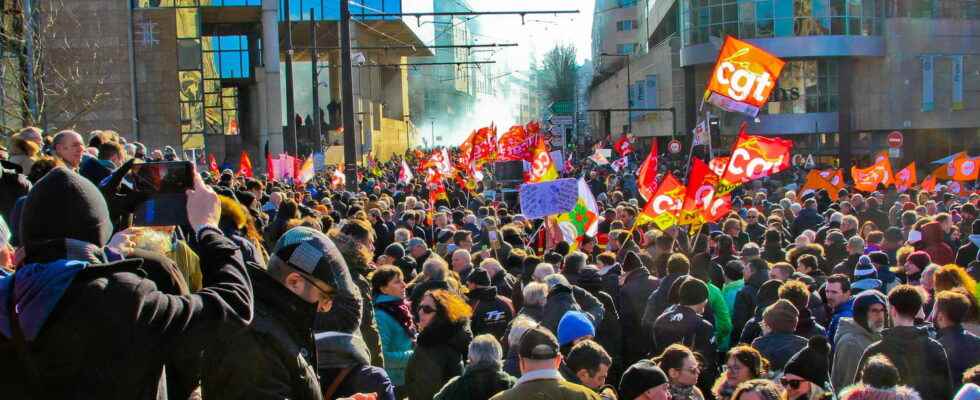The inter-union called for a day of mobilization on Saturday February 11 but more than on the strike, the challenge of this day is mainly based on the scale of the demonstrations. Will the French take to the streets?
No respite in the fight against pension reform. At the end of the second day of mobilization, the inter-union had set two appointments: that of the strike of February 7 and that of Saturday February 11. After the mobilization of this Tuesday, what to expect from that of Saturday? “We will try to do more,” CFDT general secretary Laurent Berger said confidently on Tuesday from the Parisian procession. Tuesday evening, the inter-union also called on “the entire population to demonstrate even more massively on Saturday February 11 throughout the territory to say no to this reform”, but not only. By the next day of strike against the pension reform, “it invites to question the deputies and senators and to multiply the actions, initiatives, meetings or general assemblies everywhere on the territory, in the companies and services, in the places of study, including by strike”.
What is the list of demonstrations on February 11?
After the mobilization of Tuesday February 7, place to that of Saturday February 11. On the interactive map of the CFDT, there are already about sixty appointments. Tuesday evening, however, many major cities had not yet communicated on meeting times and locations. This was particularly the case for Paris, Lyon, Marseille, Bordeaux and Lille.
- Toulouse: demonstration at 10 a.m., Allée Charles de Fitte (Saint-Cyprien)
- Rennes: demonstration at 2:30 p.m., place de Bretagne
- Strasbourg: demonstration at 11 a.m., place Kléber
- Metz: demonstration at 10 a.m., Place du General de Gaulle (station forecourt)
- Saint-Étienne: demonstration at 10 a.m., Châteaucreux station
- Bourg-en-Bresse: demonstration at 10.30 a.m., at the Prefecture
- Nice: demonstration at 11 a.m., place Garibaldi
- Montpellier: demonstration at 1 p.m., bank of the Lèz
- Ajaccio: demonstration at 10 a.m., at the station
- Bastia: demonstration at 10 a.m., at the courthouse
- Roanne: demonstration at 10 a.m., at the station
- Le Puy: demonstration at 10:30 a.m., Place Cadelade
- Avignon: demonstration at 2 p.m., Place de la République
- Nîmes: demonstration at 2.30 p.m., place Jules Guesde
- Saint-Gaudens: demonstration at 3 p.m., place Jean Jaurès
- Mulhouse: demonstration at 10 a.m., square de la Bourse
- Belfort: demonstration at 10 a.m., at the people’s house
- Limoges: demonstration at 1:30 p.m., at the Tourny crossroads
- Bayonne: demonstration at 10 a.m., place Sainte Ursule
- Pau: demonstration at 10 a.m., place de Verdun
- Tarbes: demonstration at 10 a.m., at the Labor Exchange
- Dax: demonstration at 9.30 a.m., forecourt of the station
- Tours: demonstration at 2 p.m., place Jean Jaurès
- Amiens: demonstration at 10:30 a.m., at the Maison de la Culture
- Cambrai: torchlight procession at 6.30 p.m., at the station
- Valenciennes: demonstration at 2 p.m., Place d’Armes
Massive demonstrations on February 11?
If the demonstrations still have to be organized for some, it is certain that the rallies will take place. The unions are counting on the mobilization of the French to give even more weight to their protest. “With all those who will come on Saturday and who did not come today, we will be well above [des chiffres, ndlr] of January 31”, judged Philippe Martinez, the boss of the CGT, before the start of the Paris demonstration on February 7.
Several arguments feed the hope of seeing the processions fill up for the demonstrations of February 11: first the confirmed support of public opinion for the social movement against the pension reform. A survey by Toluna-Harris Interactive for RTL, published on February 6, shows that the majority of French people are still opposed to pension reform: 65% of French people would be against the pension reform project and 72% say they support the demonstrations. But it is especially the day of the mobilization that counts: a Saturday. For the first time since the start of the protest movement, the French will be able to demonstrate on weekends without having to give up a day’s salary.
Demonstrations on February 11, and a strike?
Initially, the intersyndicale called for a day of strikes and demonstrations on February 11. But after the fact, the idea of favoring demonstrations took precedence over the desire to lead a new strike. And for good reason: is it wise to disrupt the daily life of the French during the weekend, what is more during the first crossover of the school holidays? The unions have more to lose than to gain on a strike in the middle of the weekend when demonstrations only have advantages for their fight. Some sectors have already decided. At the SNCF, the inter-union has given up a strike but invites all employees and more broadly all those who can to join the processions.
